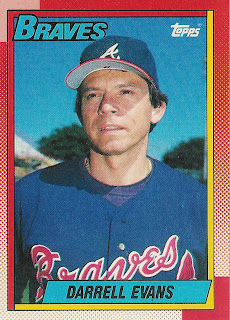Another of the legion of future Dodger's playing at Albuquerque in the early 80's was Franklin Stubbs. After several years in the minors he arrived in 83 with the Dukes. His teammates included Sid Bream, German Rivera, Candy Maldonado and Orel Hershiser. Excluding Hershiser the other hitters were sluggers and like their alum Greg Brock and MIke Marshall they were all part of a group that were expected to rip the cover off the ball in the majors. Once there however, it was learned that their prodigious power numbers in AAA were the result of the thin, warm air of Albuquerque. Playing as a reserve in 84 and 85 he became a starter in 86 with a promising 23 homers and 58 RBI's.Those would remain his career high with the Dodgers. 87 would see a nightmare .233 and just 8 homers and only 23 RBIs. He was so bad he racked up a WAR of -0.8!
During the World Championship session of 88 he spent most of his time on the bench. In the World Series he hit .294 and drove in 2 runs along with hitting a pair of doubles. In 89-the year this picture was taken-he a career high .291 but just 4 homers and 15 RBIs in only 69 games. By the time this card came out he was a Houston Astro after having been traded before Opening Day to Houston for Terry Wells.
In Houston's notorious pitcher's park he tied his career best 23 homers and set his personal mark of 71 RBIs. Setting his career best WAR of 2.8 he also put up a remarkable 2.7 dWAR in the mammoth outfield of the Astrodome. After his career year he entered free agency and sighed with the Brewers upgrading his salary from $450,000 in 90 to $1.8 million in 91 and $2.1 million in 92. While his pay increased his WAR was only a 0.2 over his two years with Milwaukee. Only able to get a minor league contract he spent 93 with the Red Sox AAA team in Pawtucket and in 94 he played in Mexico. Returning to the majors in 95 with the Tigers he appeared in 62 games hitting .250 with a couple of home runs and 19 RBI's. Entering free agency his playing career came to an end. Since the end of his playing days he has worked steadily in the minors as a hitting coach returning to Albuquerque for the 2013 season in that role.





























